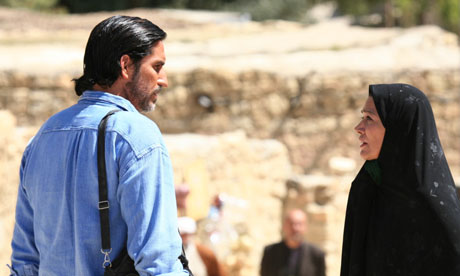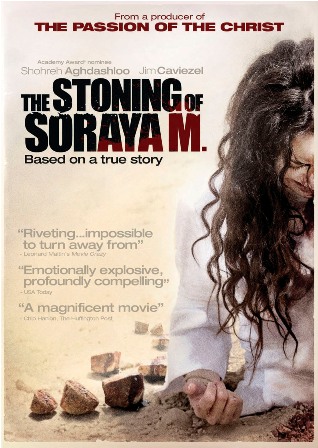The Stoning of Soraya M. (2008) is a Drama set in Iran in 1986, which opens with a Muslim woman journeying to the side of a river, and plunking bones from the sand. She washes the bones off in the water, and buries them back in the sand, praying. Meanwhile, journalist Freidoune Sahebjam (James Caviezel) breaks down in a remote Muslim town. The local mechanic, Hashem (Parviz Sayyad), agrees to fix his car, but it will take a while. As he walks further into the town, he's approached by the same older, but attractive woman, Zahra (Shohreh Aghdashloo) who had washed the bones she buried, who tells him that the town is not what it appears- there is evil here. She's quickly dismissed by the Mullah, (Ali Pourtash) and the Mayor, Ebrahim (David Diaan) who tell the stranger she is a crazy hag in the town, and not to trust her. But Zahra is not swayed by this, and she regains his attention while he's eating lunch by throwing him a map of the town to get to her house, with a human bone wrapped up inside. He's intrigued. When he's done eating, he follows the map to her house. She wants him to record her story of what happened only days ago, because in this situation, a woman doesn't have a voice, so she will give it to him. The story she tells is about her niece, Soraya (Mozhan Marnò) who is involved in an abusive relationship with a man who only wants to be rid of her and his two daughters, to keep his two sons and to marry his 14-year-old prized girl. When the Mullah offers Soraya the option of being his "temporary wife," a role justified in the Koran, but shunned by the women as being a whore, she and Zahra are deeply offended, and Zahra chases him out. But her husand, Ali (Navid Negahban) stil wants to be rid of his wife. And when she takes over as houselady for Heshan after the passing of his wife, he sees an idea: an idea that means death by stoning for any woman under Sharia law: Adultery.
This film is based on the novel, La Femme Lapidée, by French-Iranian Journalist, Freidoune Sahebjam, in 1990. It's based on true events which he obtained from a similar woman in 1986 Iran. The film is adapted by Betsy Giffen Nowrasteh and Cyrus Nowrasteh, and was also directed by Cyrus Nowrasteh. The book itself has been banned in Iran, for obvious reasons, and though the locals still claim that the events seen or read in the story are falsified, Sahebjam sticks to his story that it is true. He has also been a war correspondant, and spent some time writing about the wrongs wraught upon the Baha'i community by the Iranian government, as well.
Words almost don't describe how much I loved this movie, and so much is recieved from a film that's won almost no awards- certainly not nominated for any Golden Globes or Oscars. Good grief, the acting is superb. The violent graphics are phenominal. The look and feel of the setting is perfect. I get the impression that this film may have been made on a low budget, but they used every penny to perfection. I also love that they didn't opt for English. This is a subtitled, American made film- and sometimes American directors take the easy way out and just give all the characters English speaking parts with accents- but not this film. The spoken language is beautiful, and having to read did not take away from the sets as it sometimes can. You really feel for Soraya every step of her beaten path which she follows. The climax is one of the hardest things I have ever had to watch- and I saw Passion of the Christ in theatres when I was 13. You know all along, based on the title of the film, where it's heading, but it doesn't make it any easier. They thought Hitchcock was the master of suspense? You just want this poor woman to be put out of her misery for Christ sake.
No complaints about this movie, and honestly, I feel it should be shown in religious classes- NOT as an anti-Islam film. I am against no race, sexual preference, gender, philosophy or religion- but at the same time, some people are. And far too many American children grow up texting and watching Bratz and having no concept of appreciation for the world they live in. They grow up to say, "this doesn't really happen," but it DOES really happen, all the time- every day. Many countries today still practice this same ritual exhibited in the film. I reccomend this film to people interested in gender studies, religion, thrillers, suspense, historical dramas, biographies, Islam, and crime and punishment. No one deserves what this woman had done to her- least of all an innocent. And Jesus thought he had it bad? Rumor is it didn't take him long to die. Give this a watch. Allah is not present.




No comments:
Post a Comment